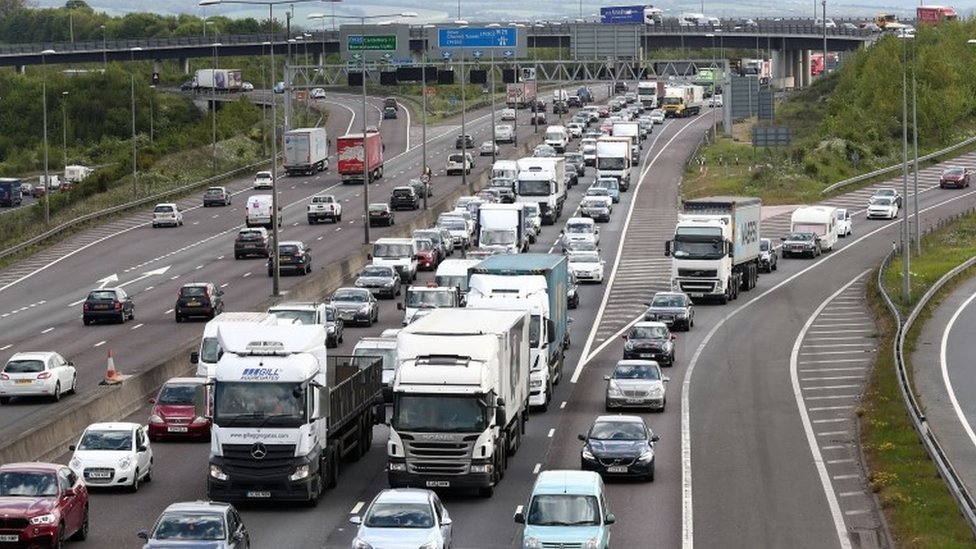 Image copyright Getty Images Image caption The future management of the Irish border is one of three main priorities in UK-EU Brexit talks
Image copyright Getty Images Image caption The future management of the Irish border is one of three main priorities in UK-EU Brexit talks The government has said it does not want any border posts between Northern Ireland and the Republic of Ireland in its new position paper on Brexit.
The paper is part of its negotiations with the European Union and the broad ideas in the document appear familiar.
It says the government does not want to see any physical infrastructure at the Irish border, such as customs posts.
But Brexit critics have complained that the UK’s proposals lack credible detail on how that aim could be achieved.
Northern Ireland is the only part of the UK which will share a land border with an EU member state when Britain leaves the EU in March 2019.
The future management of that border is a highly sensitive issue and is one of three main priorities in UK-EU Brexit negotiations.
As revealed on Tuesday, Brexit Secretary David Davis wants a time-limited period to implement any new customs arrangements, including considerations relating to the «unique circumstances» of Northern Ireland and the Republic of Ireland.
The government has repeated its desire to maintain the Common Travel Area and the rights of UK and Irish citizens, and to uphold the 1998 Good Friday Agreement.
The paper also dismisses the idea of a customs border in the Irish Sea, saying it would be economically and constitutionally unviable.
It recognises that all this needs to be negotiated with the EU, in the hope that the border between the EU and the UK will be as «seamless» as possible.
Image caption The government ruled out suggestions of concentrating border checks at Irish Sea crossings An Irish government spokesperson welcomed the position paper as «timely and helpful» as it offers more clarity on the UK’s strategy.
However, they warned: «Protecting the peace process is crucial and it must not become a bargaining chip in the negotiations.»
Campaigners who oppose Brexit have claimed that the re-introduction of a so-called «hard border» would severely damage the Northern Ireland peace process and have a negative economic impact.
UK-Irish trade in numbers
- £13.6bn worth of goods exported to the Republic of Ireland from
Brexit: UK position paper opposes Irish border posts
 + развернуть текст сохранённая копия
+ развернуть текст сохранённая копия
 Image copyright PA
Image copyright PA New diesel and petrol cars and vans will be banned in the UK from 2040 in a bid to tackle air pollution, the government is set to announce.
Ministers are to unveil a £255m fund to help councils introduce steps to deal with pollution from diesel vehicles as part of £3bn spending on air quality.
The government will publish a court-mandated clean air strategy later, days before a High Court deadline.
Campaigners said the measures were promising, but more detail was needed.
The government was ordered by the courts to produce new plans to tackle illegal levels of harmful pollutant nitrogen dioxide.
It came after the courts agreed with environmental campaigners that previous plans were insufficient to meet EU pollution limits.
Retrofitting buses
Ministers had to set out their draft clean air strategy plans in May with the final measures due by 31 July.
Local measures could include retrofitting buses and other transport to make them cleaner, changing road layouts, altering features such as speed humps and re-programming traffic lights to make vehicle-flow smoother.
Campaigners want government-funded and mandated clean air zones, with charges for the most-polluting vehicles to enter areas with high air pollution, included in the plans, as well as a diesel scrappage scheme.
But ministers have been wary of being seen to «punish» drivers of diesel cars, who, it argues, bought the vehicles in good faith after being encouraged to by the last Labour government on the basis they produced lower carbon emissions.
The UK announcement comes amid signs of an accelerating shift towards electric cars instead of petrol and diesel ones both at home and abroad:
- Earlier this month, President Emmanuel Macron announced similar plans to phase out diesel and petrol cars in France, also from 2040.
- BMW announced on Tuesday that a fully electric version of the Mini will be built at the Cowley plant in Oxford from 2019.
- Swedish carmaker Volvo has said all new models will have an electric motor from the same year.
Analysis
By Roger Harrabin, BBC environment correspondent
The government’s plans will not contain a vehicle scrappage scheme. And it won’t mandate councils to charge dirty vehicles to enter cities.
Compulsory clean air
New diesel and petrol vehicles to be banned from 2040 in UK
Тэги:
рубежом
Как определить, богат или беден человек, по его внешности?
2017-07-14 22:26:18
 + развернуть текст сохранённая копия
+ развернуть текст сохранённая копия
Как определить богат или беден человек по его внешности? Учёные из Университета Торонто (Канада) провели необычное исследование и выяснили, что, оказывается, наш мозг способен сам определять финансовое положение исключительно по выражению и чертам лица....
Сообщение Как определить, богат или беден человек, по его внешности? появились сначала на GROSH.
Тэги:
бедность,
наука,
рубежом,
эксперимент
Платить меньше налогов или отдавать больше государству: что думают в разных странах?
2017-07-07 18:40:42
 + развернуть текст сохранённая копия
+ развернуть текст сохранённая копия
Платить меньше налогов или отдавать больше государству: что думают в разных странах? Платить меньше налогов и пользоваться не самой качественной социальной инфраструктурой, или же отдавать больше и получать взамен действительно хорошее обслуживание в госучреждениях?...
Сообщение Платить меньше налогов или отдавать больше государству: что думают в разных странах? появились сначала на GROSH.
Тэги:
государство,
налоги,
рубежом,
чиновники